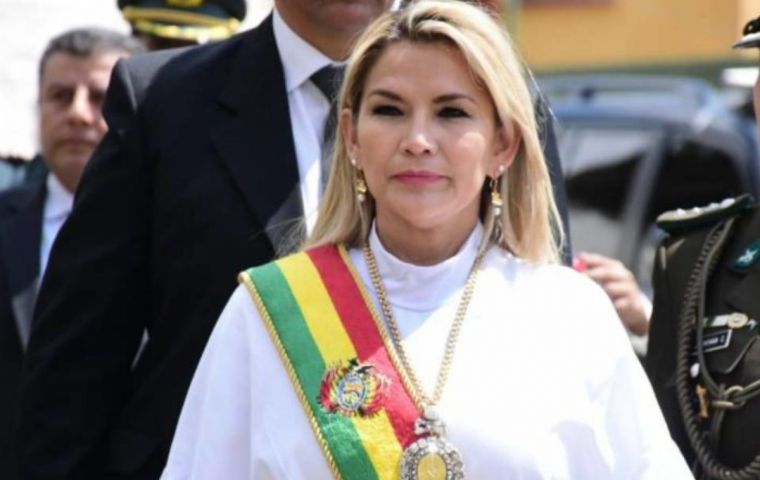MercoPress. South Atlantic News Agency
Bolivian Prosecution files genocide charges against former President Áñez
 Áñez has been under arrest since March
Áñez has been under arrest since March Bolivia's Attorney General Juan Lanchipa announced Friday that his office had filed charges of “genocide” against former interim President Janine Áñez for the massacre of several opposition protesters in the 2019 events which resulted in Evo Morales' resignation.
Áñez, who is already under preventive arrest, has not made any comments so far regarding the new accusations, but last Tuesday she had posted on Twitter that “we demand respect for the Constitution, guarantees with due process and equal conditions.”
Lanchipa explained that he submitted “before the Supreme Court of Justice an accusatory request against the citizen Jeanine Áñez,” which includes charges of “genocide,” which might entail a prison sentence of between 10 to 20 years, according to the Bolivian Penal Code.
The Conservative Áñez was appointed interim president on November 12, 2019, two days after Evo Morales resigned amid streets protests over his controversial reelection for a fourth term and fled the country.
Some 37 people were killed in clashes between Morales supporters and opponents, as well as between protesters and security forces.
The charges against Áñez stem from the complaint of relatives of the victims of the November 15, 2019 repression in the town of Sacaba, near the central city of Cochabamba, and on November 19 at the Senkata gas plant in the city of El Alto, near La Paz.
In a report released earlier this week, the Interdisciplinary Group of Independent Experts (GIEI) of the Inter-American Commission on Human Rights (IACHR), mentioned a total of 22 deaths had been recorded in the 2 incidents, which were labelled as “massacres.”
Nevertheless, Lanchipa's court papers only mention “20 dead” in Sacaba and Senkata. These events have been “provisionally classified as genocide, serious and minor injuries and injury followed by death,” said the prosecutor.
Áñez stepped down in November 2020 after the election of Morales' ally Luis Arce. In March she was placed under arrest. Áñez and several of her ministers and former military and police chiefs are believed to have acted with the support of the Catholic Church, the European Union, Bolivian politicians of the right and centre, as well as the governments Ecuador and Argentina, headed at the time by Presidents Lenín Moreno and Mauricio Macri respectively.
According to Bolivian law, the highest court must ask Congress for approval to start the proceedings against Áñez. It remains to be seen whether that support can be gathered since the ruling party does control the Legislative Branch albeit not by such a majority.
While politicians are already debating making amendments to the Judiciary, Justice Minister Iván Lima foresees the process against Áñez might move on under a new Supreme Court of Justice. The incumbent magistrates are to leave their offices in two years.
Two other criminal actions against Áñez are underway at lower courts, one for the alleged commission of the crimes of sedition, terrorism and conspiracy, and the other for alleged breach of duties.




Top Comments
Disclaimer & comment rulesCommenting for this story is now closed.
If you have a Facebook account, become a fan and comment on our Facebook Page!